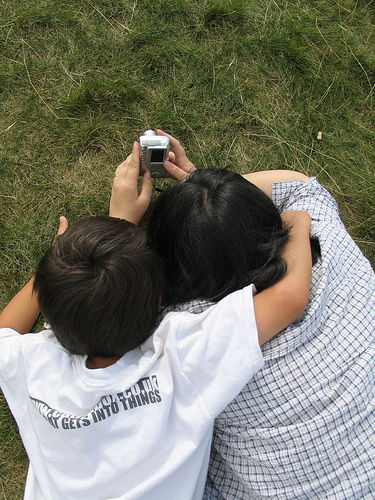Coda
 Our family had returned from Israel. We had, eventually, embraced the mid-trip loss of our camera. We drew sketches of the special places we had been. We laughed and then sighed, without attempting to re-enact and re-capture the laughter for the camera. We returned home without pictures. We had moved on.
Our family had returned from Israel. We had, eventually, embraced the mid-trip loss of our camera. We drew sketches of the special places we had been. We laughed and then sighed, without attempting to re-enact and re-capture the laughter for the camera. We returned home without pictures. We had moved on.
And then we got the email. Our sister-in-law, who lives in Jerusalem, sent it, and included the whole chain of correspondence, originating with a random Israeli guy who was walking the streets of the Old City and had found our camera. He picked it up, flipped through the pictures, realized the camera must belong to a family on a trip, downloaded one of the pictures, and sent an email to his entire contact list, saying: “Sucks to lose a camera on a family trip. Does anyone recognize these guys?” His huge list of contacts forwarded it on to their huge list of contacts, and, in the fourth iteration, someone recognized my brother-in-law, and sent him an email, saying: “Hey, did you lose your camera in the old city?”
That is how it came to be that we have all of the pictures we took during the first week of our trip to Israel, and how it is that our camera, including the five-shekel piece my three-year-old had asked me to put in the front pocket of the camera case for safe-keeping, are en route across the world, heading home.
At first I was exuberant, lauding the positive uses of social media and a wide web of online “friendships,” joyously sharing the story as a model of the power of the kindness of strangers, the goodness of human nature, the beauty of the people of Israel. I downloaded the pictures with disbelief, sending them to friends and family, acknowledging the truth – I had accepted these were gone, but I am so happy to have them back!
But now I await the camera with breathless suspicion. Can it be that something you have accepted as gone, no longer part of your world, no longer a piece of your reality, can somehow resurface, intact?
We had traveled to Israel to mark the anniversary of my mother-in-law’s death. It was the first time my husband’s family had gathered together since the Shiva; this time we gathered at the gravesite for the unveiling. Though we never expressed it as such, I can’t help but think that we all irrationally somehow hoped we would arrive in Israel and see her again, be met with her smile, her reassurance – oh, I didn’t disappear into some other unknown realm, I am here, I have been here all the while.
We work so hard to accept loss. To accept that what we plan can change, and, in a moment, disappear. That what we perceive as ours, our property, our rights, our people, are, after all, not ours; we grasp at them as if at foggy shadows. And we manage to continue to live, to have children, to buy homes and cameras, to pursue our visions. And we do it all with a latent acceptance that unexpected loss is a possibility. But to do it while accepting that we can lose it all in a moment, and, once we have accepted that loss, that it can all return? Impossible.
For now I stand alone at the door, watching, waiting for the camera, and expecting it to arrive in a triumphant parade of those whom I’ve loved and I’ve lost. They will come trudging through, riding the stolen bikes, carrying packs full of lost goods, lost possibilities, lost dreams, shaking themselves off, smiling, and they will hand me the camera. We will sit together, going through their bags, holding each other, marveling at the wonder of it all.
And so I stand waiting, like the boy at the end of the Red Balloon, deflated pieces of his beloved friend strewn about him, for the parade of balloons to wriggle loose and return home, to surround me, to lift me into the skies of possibility, of things lost somehow retrieved.



